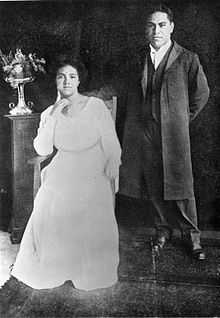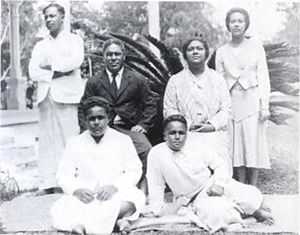Viliami Tungī Mailefihi
| HRH Prince Viliami Tungī Mailefihi CBE | |
|---|---|
| Prime Minister of Tonga | |
| In office 30 June 1923 – 20 July 1941 | |
| Preceded by | Hon. Tevita Tuʻivakano |
| Succeeded by | Hon. Solomone Ula Ata OBE |
| Personal details | |
| Born | 1 November 1887 Tonga |
| Died | 20 July 1941 Tonga |
| Political party | Non-partisan |
| Spouse(s) | HM Queen Sālote Tupou III of Tonga |
| Religion | Free Wesleyan Church |


Viliami Tungī Mailefihi (1 November 1887 — 20 July 1941) was a Tongan chief, one time Crown Prince, and consort of Queen Sālote Tupou III. He served as Prime Minister of Tonga from 1923 until his death.
He was the son of Siaosi Tukuʻaho (also see: Lakalaka), who served as Prime Minister of Tonga from to 1890 to 1893. Tungī's grandfather was Tungī Halatuituia. The line of Tungī chiefs from Tatakamotonga was descended from the then defunct Tuʻi Haʻatakalaua which in that time was more or less seen as an associate of the Tuʻi Tonga. As such they had the following from the people of Muʻa if not from the whole Hahake district. Concerning his mother's side, Mele Siuʻilikutapu, she was the granddaughter of the Tuʻi Vavaʻu: Fīnau ʻUlukālala (III, Tuapasi). As the nephew of the childless King Siaosi Tupou II he was Crown Prince of a Tonga until the birth of the king's first child, Sālote, his future wife. In 1917 he represented the Tongan king at the coronation of King George V in London.[1]
Tungī was educated at Tupou College, Tonga and Newington College, Sydney, commencing in 1896, aged nine. He was one of seven Tongan nobles to attend Newington at the time.[2] He was a follower of the Methodist Church.
He was selected by King Siaosi Tupou II to marry his oldest daughter and heir, Sālote, even though she was 12.5 years younger than he. The wedding took place on 19 September (Christian ceremony) and 21 September (Tongan ceremony, the tuʻuvala) 1917, less than a year before Siaosi would die and Sālote would be crowned as queen. The marriage was a success. Tungī's personality and status did a lot to elevate the esteem of the people towards their queen. Furthermore, their children born would carry the combined bloods of the 3 major Tongan royal dynasties. Tungi would always be remembered as very generous to all his relatives. His death in 1941 was a heavy blow not only to Queen Salote but to all Tungi's relatives.[3][4]
Honours
-
Honorary Commander of the Order of the British Empire (CBE)
References
- ↑ "A PRINCE OF TONGA.". The West Australian (Perth, WA : 1879 - 1954) (Perth, WA: National Library of Australia). 29 March 1911. p. 4. Retrieved 23 December 2013.
- ↑ "Crown Prince of Tonga.". Australian Town and Country Journal (NSW : 1870 - 1907) (NSW: National Library of Australia). 20 November 1897. p. 19. Retrieved 23 December 2013.
- ↑ ʻOkusitino Māhina. "Psychoanalysis and Tongan Poetry". Literature and Aesthetics: the Journal of the Sydney Society of Literature and Aesthetics 13 (1): pp. 97–106. ISSN 1036-9368.
- ↑ 'I F Helu; I C Campbell; Eve Coxon (2005). "Tatau, potupotutatau and mālie: A realist reflection on the symmetry, harmony and beauty of Queen Sālote’s poetry". Polynesian Paradox: Essays in Honour of Professor 'I. Futa Helu. Suva, Fiji: Institute of Pacific Studies, University of the South Pacific. pp. 168–83. ISBN 982-02-0371-6.
| Preceded by Hon. Tevita Tuʻivakano |
Prime Minister of Tonga 1923–1941 |
Succeeded by Hon. Solomone Ula Ata OBE |
| ||||||||